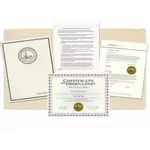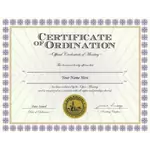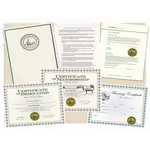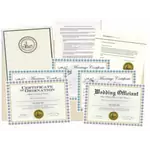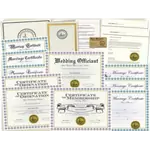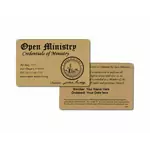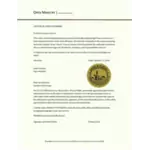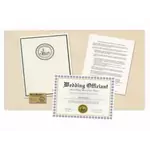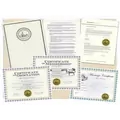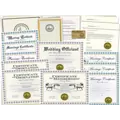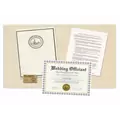Information on How to Get Ordained and Register as a Minister
How to get ordained and perform a wedding or ceremony in New York.
Since 2010, Open Ministry has been ordaining and helping people all over the world perform weddings, ceremony and other sacerdotal duties. This page focuses on requirements and information for New York, if you don't need the States Statues or ordination information for New York scroll down to the bottom of the page for links to other states.
Let's get started with the information for New York
If you are planning to get ordained in New York or you have been asked to perform a wedding ceremony in New York, or simply need to to find a minister in New York to perform your wedding ceremony the information on this page will assist you. If you still have questions we invite you to visit our FAQ or contact us for more detailed information. We are here to help and support our ministers and congregation.
Registered Ministers with Open Ministry have successfully performed thousands of marriages in New York and around the world!
The Ordination and Officiant information is provided below in an easy five step layout which is designed help walk you through the most common steps on registering to become a minister for New York and how perform a wedding ceremony in New York.
Step 1 - How to Become Ordained
How to get Ordained in New York and become a minister to perform weddings and marriage ceremonies in New York
Ordinations for New York are completely free and can normally be completed in less than a day. Thousands of people have registered and became licensed ministers in New York. Once you have completed the ordination process you are able perform marriages through Open Ministry in and for the state of New York!
Become Ordained for free and start your journey as an authorized minister in New York with Open Ministry.
Get started today by clicking on the link below!
Step 2 - Contact The County Clerk
How to Register to Officiate a Marriage in New York
Next, contact the office of your local marriage authority (typically your county clerk in New York). Let them know that you are a ordained minister with Open Ministry in California, and ask them what information the will require of you, to officiate a marriage in New York. Most clerks and governing agencies may require that you present them with a physical copy of your ordination record.
When speaking with the county clerk; it can be helpful to use the following phrases.
- What agency or department issues marriage licenses in your county and how may I contact them?
- I am an ordained minister with a church in California and I would like to register as a wedding Officiant in your county to perform and solemnize weddings.
- I have my Letter of Good Standing and/or Ordination Credential as proof of my ministry and ordination.
- What additional documentation is required for me to register as a wedding Officiant in your county or state?
Step 3 - Getting Licensed to Perform the Marriage
License to perform a wedding in New York
After you've contacted your marriage authority, you will want to visit our bookstore to get physical copies official credentials for presentation and your records. (See New York State Statutes for More Specific Requirements )
When registering in New York you may be asked to display proof of your ordination to the county clerk's before they will accept the marriage license as having been legally solemnized. We typically advise ministers of New York to get a Complete Minister Package for New York which includes your Letter of Good Standing (the live signed and notarized physical copy of your standing with our ministry).
Having your physical copies credentials provides peace-of-mind to couples and others that you intend to marry. Additionally, we recommend at least 4 weeks between the date of the wedding ceremony and your order, to ensure that you receive all of your materials and are able to register in time. Please note that every state and county can impose different requirements. This may include other nominal fees and additional paperwork that may need to be completed before the ceremony can take place.
It is important to note that some county clerks in New York may require wedding officiants to attach a statement which asserts some of the elements in the marriage license upon submission, including the following:
- The time and location at which the wedding took place
- The names and places of residence of all official witnesses
- The religious organization in which the officiant is ordained
- The printed name and address of the officiant
Please note that, when filling out a marriage license, that New York State may request you use the title "Minister" or "Reverend". The County Clerks may also require you enter your denomination, you can use "Non-Denominational". Failing to state a denomination may result in rejection and could require a duplicate marriage license.
Step 4 - How to Perform the Wedding
How to perform a wedding in New York
Once you have completed of the above, you are ready to perform the wedding! Be sure that the couple has picked up their New York state issued marriage license from the appropriate office. New York marriage licenses valid for a set number of days, and there may be a waiting period between when the couple receives the marriage license in New York and when the ceremony may be legally performed in New York. This information should be written on the license and followed to ensure the ceremony is recorded properly.
Please be aware that the signed license must be returned to the issuing office in New York before the time limit is reached. Check the marriage license for the exact dates. Once the the previous matters have been addressed, officiating a wedding in New York can be a great and wonderful experience.
If you have any comments or issues as a wedding officiant in New York, or after you have been ordained, or would like to just asking for guidance on how to perform a wedding ceremony in New York. We recommend that all new New York wedding ministers who have issues or concerns about the ceremony read over our helpful guides.
New York
If you are or have been asked to perform a wedding in the City of New York. The county clerk will require you to have the Letter of Good Standing for New York City, which will contain Appendix A and B for registering.
11 By whom a marriage must be solemnized
No marriage shall be valid unless solemnized by either:
1. A clergyman or minister of any religion, or by the senior leader, or any of the other leaders, of The Society for Ethical Culture in the city of New York, having its principal office in the borough of Manhattan, or by the leader of The Brooklyn Society for Ethical Culture, having its principal office in the borough of Brooklyn of the city of New York, or of the Westchester Ethical Society, having its principal office in Westchester county, or of the Ethical Culture Society of Long Island, having its principal office in Nassau county, or of the Riverdale-Yonkers Ethical Society having its principal office in Bronx county, or by the leader of any other Ethical Culture Society affiliated with the American Ethical Union.
2. A mayor of a village, a county executive of a county, or a mayor, recorder, city magistrate, police justice or police magistrate of a city, a former mayor or the city clerk of a city of the first class of over one million inhabitants or any of his or her deputies or not more than four regular clerks, designated by him or her for such purpose as provided in section eleven-a of this chapter, except that in cities which contain more than one hundred thousand and less than one million inhabitants, a marriage shall be solemnized by the mayor, or police justice, and by no other officer of such city, except as provided in subdivisions one and three of this section.
3. A judge of the federal circuit court of appeals for the second circuit, a judge of a federal district court for the northern, southern, eastern or western district of New York, a judge of the United States court of international trade, a federal administrative law judge presiding in this state, a justice or judge of a court of the unified court system, a housing judge of the civil court of the city of New York, a retired justice or judge of the unified court system or a retired housing judge of the civil court of the city of New York certified pursuant to paragraph (k) of subdivision two of section two hundred twelve of the judiciary law, the clerk of the appellate division of the supreme court in each judicial department, a retired city clerk who served for more than ten years in such capacity in a city having a population of one million or more or a county clerk of a county wholly within cities having a population of one million or more; or,
4. A written contract of marriage signed by both parties and at least two witnesses, all of whom shall subscribe the same within this state, stating the place of residence of each of the parties and witnesses and the date and place of marriage, and acknowledged before a judge of a court of record of this state by the parties and witnesses in the manner required for the acknowledgment of a conveyance of real estate to entitle the same to be recorded.
5. Notwithstanding any other provision of this article, where either or both of the parties is under the age of eighteen years a marriage shall be solemnized only by those authorized in subdivision one of this section or by (1) the mayor of a city or village, or county executive of a county, or by (2) a judge of the federal circuit court of appeals for the second circuit, a judge of a federal district court for the northern, southern, eastern or western district of New York, a judge of the United States court of international trade, or a justice or a judge of a court of the unified court system, or by (3) a housing judge of the civil court of the city of New York, or by (4) a former mayor or the clerk of a city of the first class of over one million inhabitants or any of his or her deputies designated by him or her for such purposes as provided in section eleven-a of this chapter.
6. Notwithstanding any other provisions of this article to the contrary no marriage shall be solemnized by a public officer specified in this section, other than a judge of a federal district court for the northern, southern, eastern or western district of New York, a judge of the United States court of international trade, a federal administrative law judge presiding in this state, a judge or justice of the unified court system of this State, a housing judge of the civil court of the city of New York, or a retired judge or justice of the unified court system or a retired housing judge of the civil court certified pursuant to paragraph (k) of subdivision two of section two hundred twelve of the judiciary law, outside the territorial jurisdiction in which he or she was elected or appointed. Such a public officer, however, elected or appointed within the city of New York may solemnize a marriage anywhere within such city.
7. The term "clergyman" or "minister" when used in this article, shall include those defined in section two of the religious corporations law. The word "magistrate, " when so used, includes any person referred to in the second or third subdivision.
DOM Domestic Relations - Article 3
11-b Registration of persons performing marriage ceremonies in the city of New York
Every person authorized by law to perform the marriage ceremony, before performing any such ceremonies in the city of New York, shall register his or her name and address in the office of the city clerk of the city of New York. Every such person, before performing any marriage ceremonies subsequent to a change in his or her address, shall likewise register such change of address. Such city clerk is hereby empowered to cancel the registration of any person so registered upon satisfactory proof that the registration was fraudulent, or upon satisfactory proof that such person is no longer entitled to perform such ceremony.
DOM Domestic Relations - Article 3

